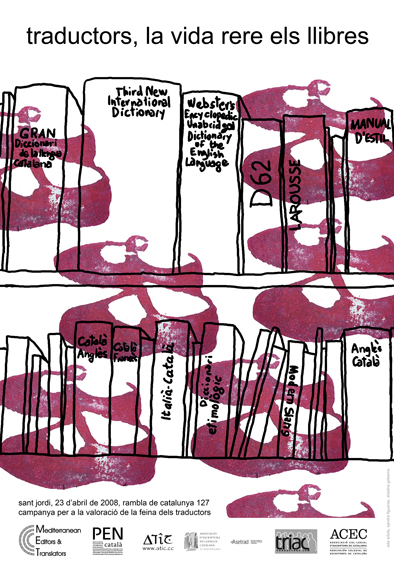Com que sóc membre de tres de les set institucions que hi participaran, hauré de passar per aquesta paradeta el dia de Sant Jordi.


Welcome / Bienvenue / Benvinguts / Bienvenidos For information about my translation services, please visit the main site. Pour des informations sur mes services, merci de regarder le site principal.Para información sobre mis servicios de traducción, visite el web principal.
Despite all the training, I still have to say “barthroom” [sic] to get Dragon to write bathroom correctly. When I say “bathroom”, I get all sorts of interpretations. To give you an idea, I’m now going to create a list by saying “bathroom – press enter” several times:
battery
bass room
bathroom
bathroom
battering
battering
bat’s room
This is very annoying.
Before writing this entry, I would like to make it clear that the purpose of this entry is not to criticise a translator, but simply to reflect upon how a particular translation could have been improved. I am sure that there are also many things that could be improved in my own translations.
I’ve just been watching a documentary on the Catalan television channel 33. As usual, I was watching the documentary in the original language, which was in English, but because the documentary was about the high levels of murders in Guatemala, all the interviews were in Spanish, so I used the audio button to switch to the Catalan audio channel so I could hear the interviews without a voice dubbed over the top.
As this was a BBC documentary, the original script for the narrator would have been in English, and this would have been translated into Catalan. At one point, they were talking about a young girl who had been killed, and as her body was moved into a coffin the narrator said, “A la Gran Bretanya, el cadàver es conserveria com a prova. Aquí la posen al fèretre.”, which in the original English would have been something like “In the UK, the body would have been kept as evidence. Here, they put it in a coffin.”
Why did the text refer to the UK? Because the documentary was comparing what happens in Guatemala with what happens in the country of the viewers. If this documentary had been made by CBS, they’d have probably said “the US” instead of “the UK”.
By keeping the reference to the UK in the Catalan version of the documentary, it doesn’t really make a lot of sense to the Catalan viewer and sounds rather arbitrary. Why is the narrator referring to what happens in the UK, rather than in another country? In Germany, the body would also have been kept as evidence, as it would in France, Italy or Belgium. So it would have made much more sense to say “in Europe” or “in Catalonia”.
This is where the question of the target audience is important. If this had been translated for the Balearic Islands channel IB3, it wouldn’t have made a lot of sense to say “in Catalonia”. Similarly, if this was being translated into French and was going to be broadcast only on French television, it would make sense to say “in France”; but if it was also going to be broadcast in Walloon and Romandy, it would make a lot more sense to say “in Europe”.
This is just a short reflection on one of the many things we have to think about, besides converting words from one language to another, when translating.